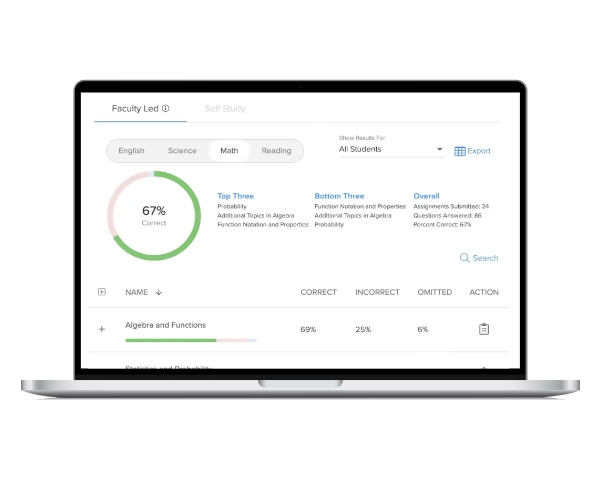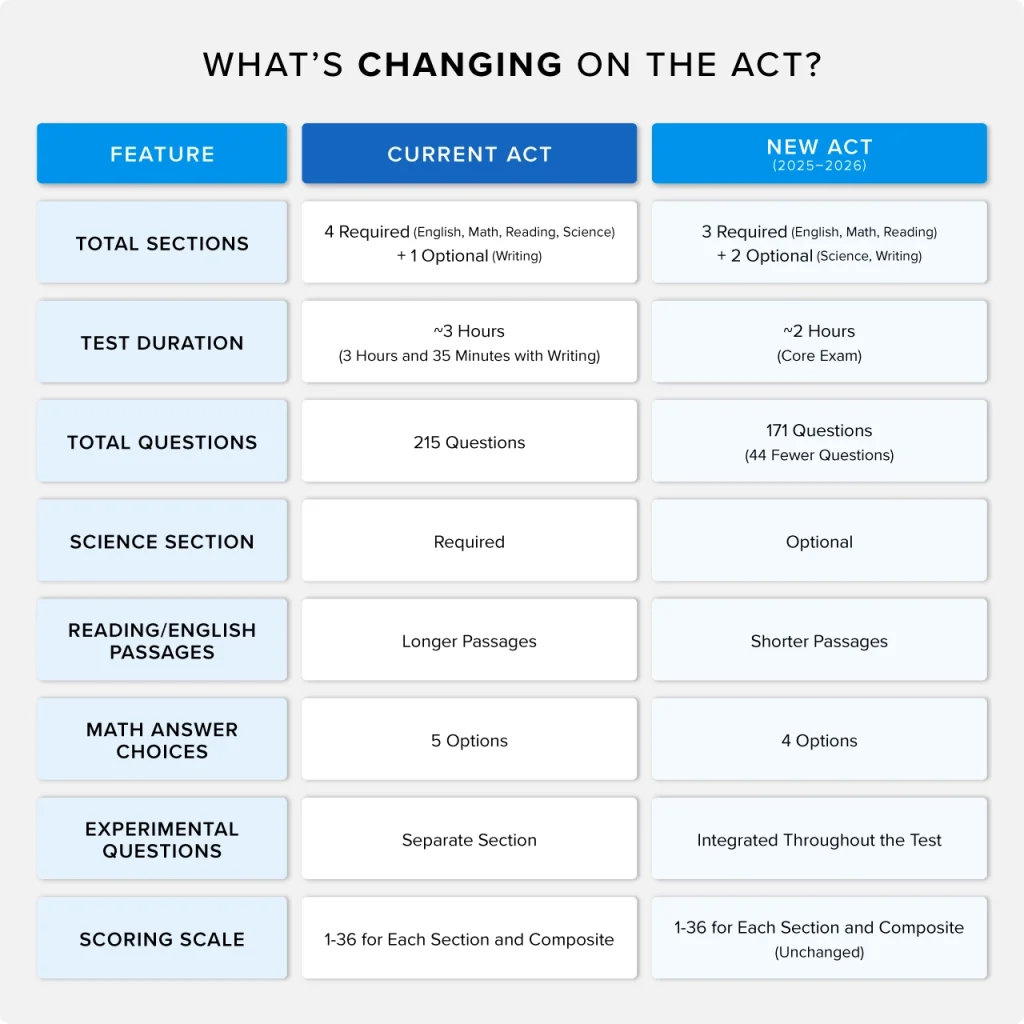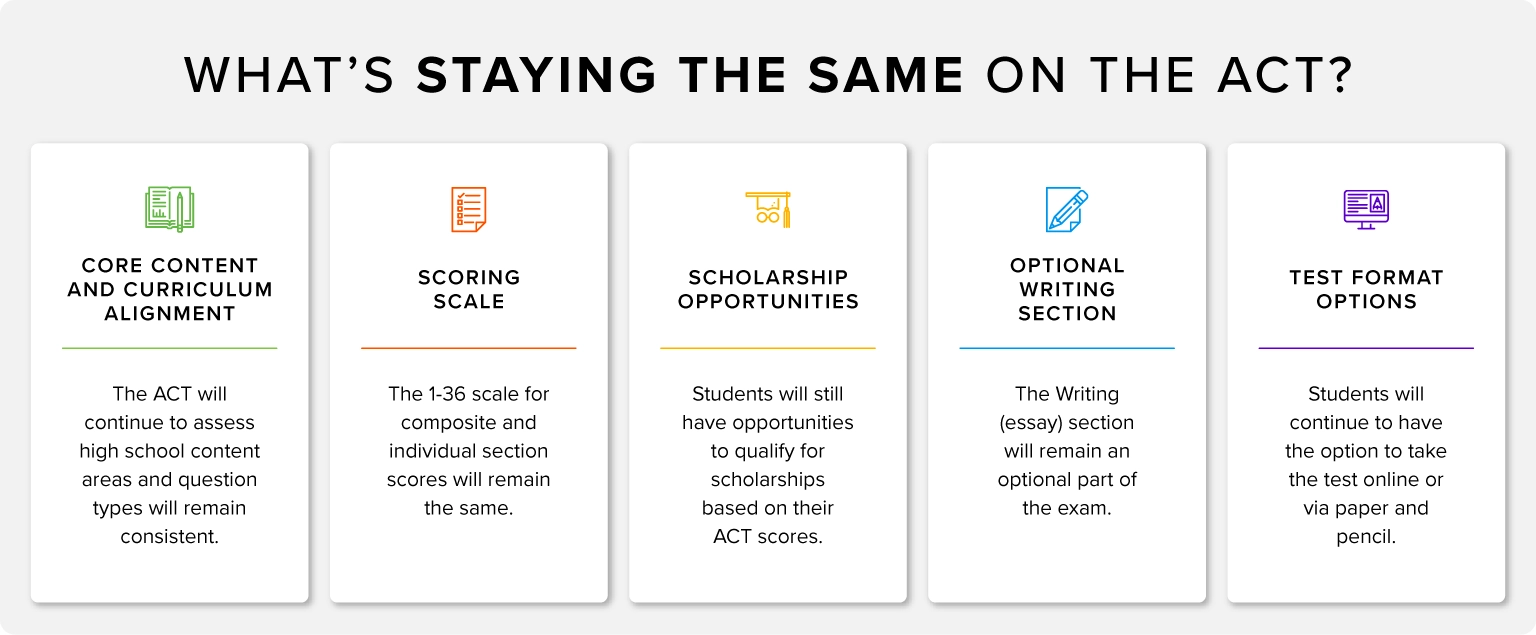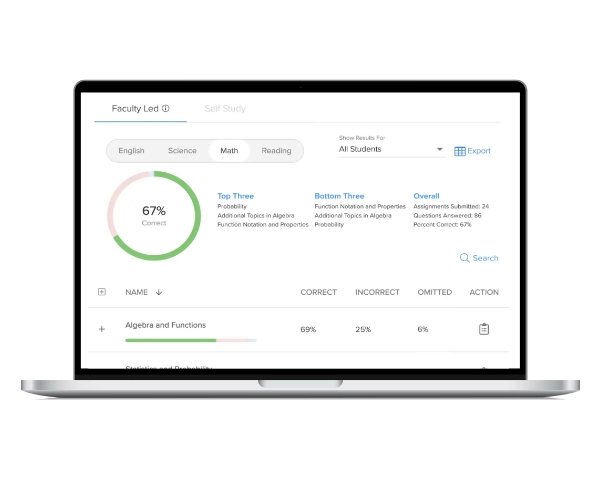ACT Test Changes in 2025 and 2026
The changes to the ACT are meant to better align with the needs of today’s students while maintaining the exam’s role as a college admissions tool. Some changes are minor, such as how experimental questions will appear on the exam. However, the two main changes the ACT will undergo will be a shorter test length —with fewer questions and shorter reading passages—and a newly optional Science section1.
Here’s a breakdown of the implementation timeline for these changes:2
- Spring 2025: The changes will affect the digital ACT tests.
- Fall 2025: Paper-and-pencil tests will reflect the new format.
- Spring 2026: The new format will be implemented for school-day ACT tests.
Students will have more flexibility with how they take the ACT: online or the traditional pencil-and-paper format. The Writing section will remain optional, allowing students to tailor the test to their strengths and college application requirements. In addition, experimental questions will be distributed throughout the test sections to help develop future exams, but they won’t affect student scores.
The Length of the ACT Exam Is Shorter
The ACT exam will become significantly shorter, shifting from a 3-hour test to approximately 2 hours. This change affects the overall structure and the number of questions.
The new format will have 44 fewer questions, bringing the total from 215 to 171. Reading and English sections will feature shorter passages, and students will have 22% more time per question. Additionally, questions in the Math section will each have 4 answer choices instead of the current 5, allowing students to work through each answer choice with more time.
The ACT Science Section Is Optional
The Science section will now be optional. If a student chooses not to take the Science section, their composite score will be calculated based solely on the Math, Reading, and English sections.
The composite score will still use the 1-36 scale, but it will no longer include the Science section unless the student chooses to take it. As is the case with the Writing section, the optional Science section gives students more flexibility in tailoring their test to better fit their strengths and college application needs.
Why Is the ACT Test Changing?
According to ACT.org, the exam is undergoing these changes for several reasons:3
- Improving the Student Experience:
The shorter test reduces fatigue and offers more time per question, allowing students to feel less rushed. Shorter passages in the Reading and English sections make the test more manageable.
- Increasing Flexibility:
The optional Science section provides students with more control over their testing experience. Students can also choose between digital and paper formats, maintaining flexibility in how they take the test.
- Modernizing the Exam:
The changes reflect the evolving needs of students and competition from the Digital SAT, which has already streamlined its format. Experimental questions will now be dispersed throughout the test.
- Enhancing Accessibility:
The shorter format of the core test (excluding Science) allows the ACT organization to lower costs associated with administering the exam, making it more affordable for disadvantaged students.

What’s Staying the Same?
Although the ACT is changing, several key parts will stay the same. The exam will still assess high school curriculum knowledge, consisting of the same content areas and question types. The familiar 1-36 scoring scale for composite and individual sections will also remain the same, and students can continue to qualify for scholarships based on their ACT scores. Additionally, the Writing section will continue to be optional.4
How Do These Changes Impact Students?
To adjust their ACT prep strategies, high school teachers first need to understand how these changes will impact their students. The new ACT offers advantages and challenges for high schoolers.
|
Pros Student Advantages as a Result of the Changes to the 2025-26 ACT: |
Cons Student Challenges as a Result of the Changes to the 2025-26 ACT: |
|
Shorter Test Duration: The test will be reduced from 3 hours to 2 hours, helping students stay focused and avoid fatigue. More Time Per Question: Students will have 22% more time per question, improving accuracy and reducing stress. Increased Flexibility: Students can choose whether to take the optional Science section, pick digital or paper formats, and opt out of the Writing section. Shorter Passages: The Reading and English sections will have shorter passages, making them easier to manage. Reduced Cost: The core test, without Science, will be more affordable, improving access for students. |
Optional Science Section: Deciding whether to take the Science section may cause uncertainty for students unsure about college requirements. Shorter Test Length: Students may need to adjust their pacing and endurance for the shorter test. Adapting to New Question Formats: Students used to longer passages will need to adapt their reading strategies. Managing Experimental Questions: Dispersed experimental questions may make it harder to identify which ones won’t count. Transition Period: The switch to the new format may cause confusion, and there could be a shortage of practice materials. |
How Teachers Can Help Students Prepare for New ACT Changes
Educators play an important role in helping students navigate the new ACT changes. Here are some strategies to help students adapt:
- Focus on Core Sections:
Since Science is optional, emphasize English, Math, and Reading — the sections that count toward the composite score.
- Adapt to the Shorter Format:
Use shorter, focused practice sessions to prepare students for the 2-hour test.
- Emphasize Accuracy Over Speed:
Teach students to carefully analyze each question instead of rushing through.
- Develop Concise Reading Skills:
Practice reading shorter passages and identifying key details quickly.
- Integrate Digital Learning:
Use online practice tests to familiarize students with the digital format.
- Teach Flexible Test-Taking Strategies:
Train students to focus on all questions equally, as they won’t know which ones are experimental.
- Simulate Real Test Conditions:
Use 2-hour mock tests to replicate real testing conditions.
- Teach Pacing:
Encourage students to monitor their time and avoid rushing, as they’ll have more time per question.
- Focus on Stamina:
Help students build endurance through intensive, focused study sessions.

Test Prep Industry Response and Resources
Test prep companies will inevitably make several adjustments to their ACT products in response to the 2025–26 changes once the ACT organization releases a practice test and example questions. With the Science section becoming optional, many companies will need to revise their materials to focus more on the core sections—English, Math, and Reading—that will form the composite score. Practice tests will need to be updated to reflect the new 2-hour format, replacing the current 3-hour version. Prep materials will also need to be adjusted to account for the additional time per question. In addition, practice materials will need to be revised to include shorter passages in the Reading and English sections to align with the new format.
As the ACT transitions to its new digital format, UWorld continues to offer a range of online instructional tools and resources that can help you prepare your students for the updated exam. With over 3,200 practice questions designed to mimic the style and difficulty of the actual ACT, UWorld will continue updating its question bank to reflect the new format as ACT.org continues to release information about the digital exam.
To help students prepare for the 2025 ACT, we encourage you to rely on several updated test prep resources:
-
UWorld’s Online Preparation for the ACT Exam: UWorld provides realistic, online practice questions with immediate feedback, detailed data reports, and customizable study tools to help students build their critical-thinking skills and testing stamina for the updated exam format.
Official ACT Prep Guide: The Official ACT Prep Guide 2024-2025 includes 9 full-length practice tests, online flashcards, and a question bank to help students prepare effectively for each section.
ACT Subject-Specific Guides: ACT’s official guides for English, Math, Reading, and Science include new questions, detailed answer explanations, and tailored strategies for targeted practice.
For more details on UWorld's ACT offerings, visit UWorld.
Frequently Asked Questions (FAQs)
When can students take the new ACT test?
How will the new ACT test compare to the digital SAT test?
Is the new ACT harder now than it used to be?
Why is the science section being removed from the ACT?
Can students take both the optional Science and optional Writing sections on the ACT?

References
- ACT. (n.d.). Enhancements to the ACT test. ACT. https://www.act.org/content/act/en/products-and-services/the-act/test-changes/enhancements.html
- ACT. (2024, July). Test enhancements for the ACT. ACT Leadership Blog. https://leadershipblog.act.org/2024/07/test-enhancements.html
- ACT. (n.d.). Changes to the ACT test. ACT. https://www.act.org/content/act/en/products-and-services/the-act/test-changes.html
- Educational Connections Tutoring. (n.d.). The ACT: New changes to the test. Educational Connections Tutoring. https://ectutoring.com/act-new-test
- ACT. (n.d.). ACT test registration. ACT. The ACT: New changes to the test. Educational Connections Tutoring.https://www.act.org/content/act/en/products-and-services/the-act/registration.html






